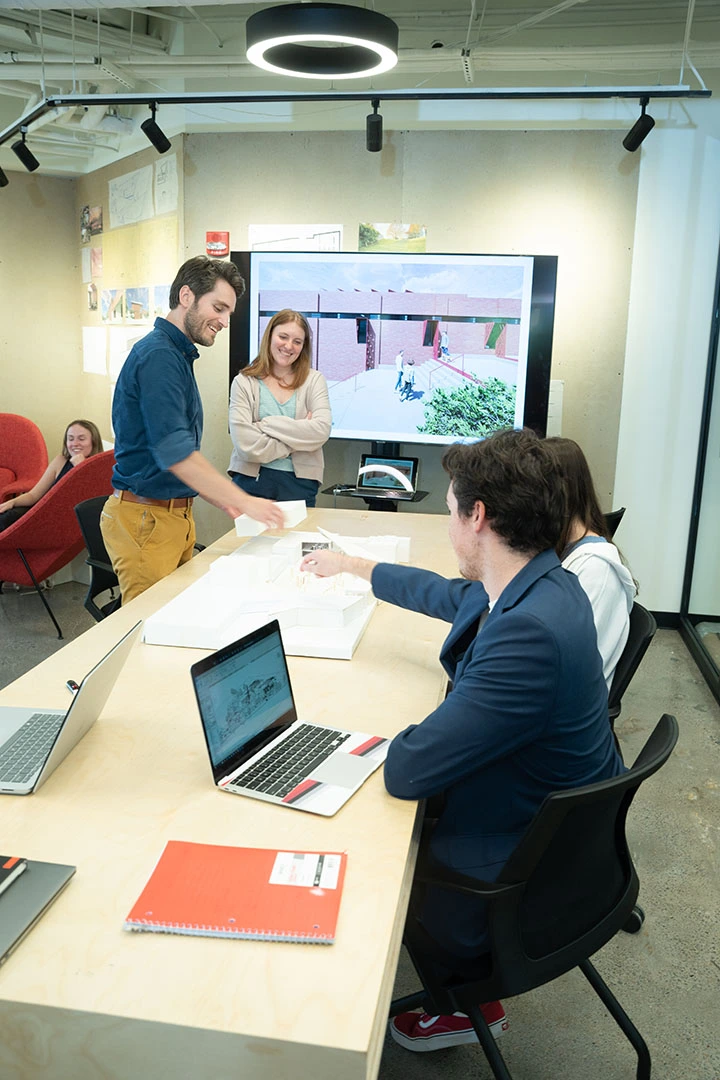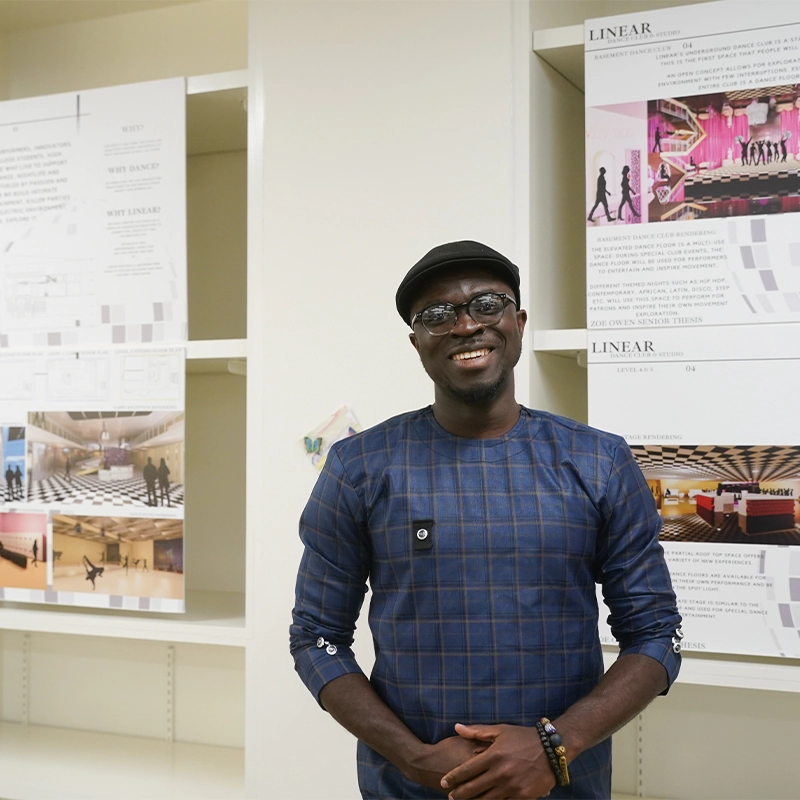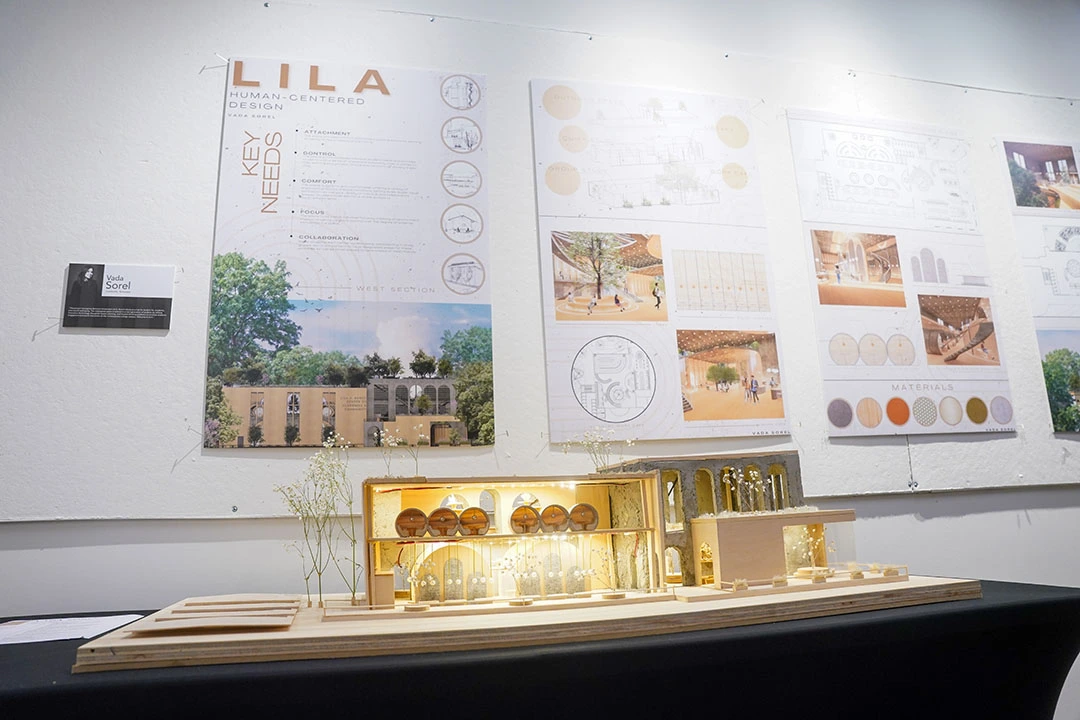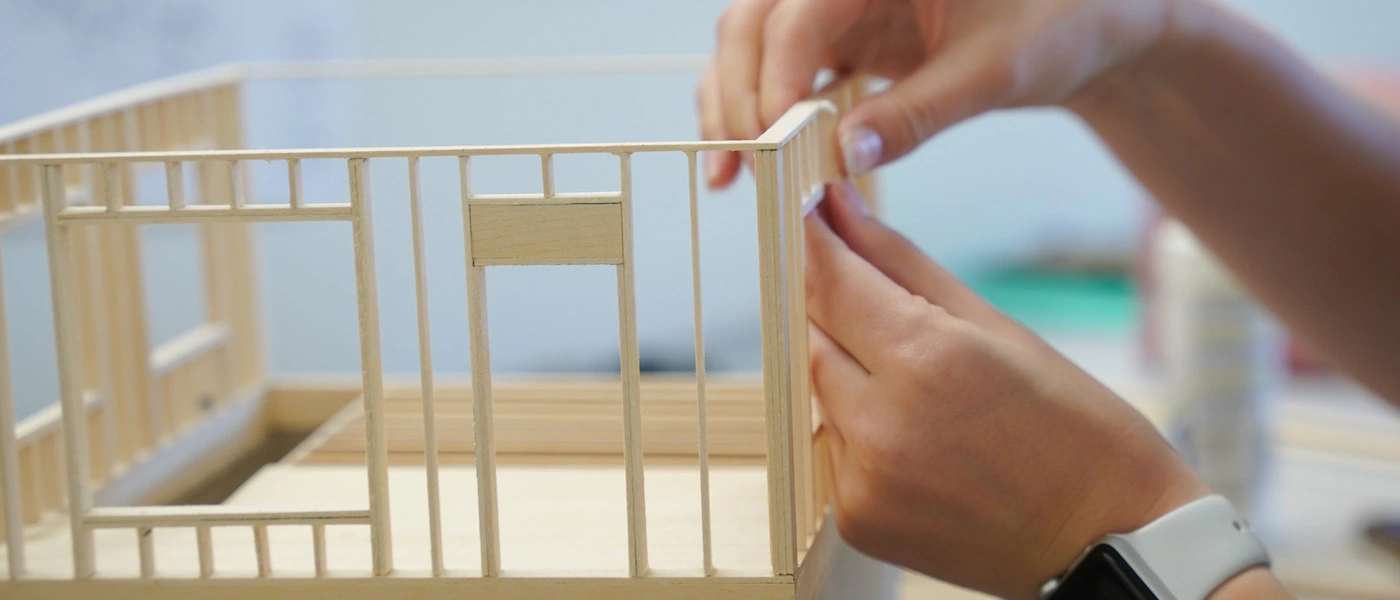 Why Major in Interior Design?
Why Major in Interior Design?
The Interior Design program at the O’More College of Architecture & Design at Belmont focuses on cultivating future professionals equipped with creative and technical skillsets, trained to design equitable user-centered environments and inspired to be leaders within their chosen vocation.
It is both a rigorous and rewarding program, rooted in internationally recognized standards set by the Council for Interior Design Accreditation (CIDA) , equipping future licensed interior designers for their chosen vocation.
Our program boasts award-winning students that compete regularly in national competitions and win, such as the prestigious Donghia Scholarship. Our students are coveted among the design community and sought-after for internships and future employment opportunities. Our alumni are well-positioned and active members of the Nashville and broader design realms.
We believe in instilling a passion for life-long learning and serving the community through transformational design. The program is ever-evolving to stay at the forefront of design futures and we value having faculty who are practicing interior designers and architects in the classroom to educate and mentor our students. We build relationships with students and understand that these relationships do not stop at graduation.
We believe in a classroom that extends beyond the walls of the Belmont campus. In addition to multiple “on-site” visits within the Nashville community, we offer opportunities to travel and be exposed to various cultures. These life experiences contribute to the introspective nature of design. We want your education to be challenging, enlightening and invaluable.
Interior design is the balance of art and science to understanding people’s behavior creating functional spaces within the built environment. Interior design is NOT decorating, although decorating can be a part of interior design. Designers can decorate, but decorators cannot design. Interior design is the sculpting of space three-dimensionally, not just the selection of applied finishes, materials, and furniture. Interior designers ensure the health, safety and welfare of the public and any user of space
The Interior Design program at Belmont not only prepares the student for a successful career but a meaningful career.
By the Numbers
Interior Design at Belmont University

Our Interior Design Program Mission
Cultivate a future professional who is a critical thinker, a creative designer and is focused on the human element of the built environment.
Our Program Goals
The Interior Design major is a four-year, CIDA-accredited program that prepares you to start your career and work towards licensure. As a student, you will:
- Focus students on the implementation of human-centered design theories
- Promote cross-disciplinary collaboration both on campus and within the community
- Create effective and professional communicators
- Foster meaningful design that balances poetic expression and pragmatic solutions
- Protect the health, safety and welfare of occupants within the built environment

A human-centered design project by Vada Sorel on display at the Interior Design Collective
Spring & Summer Enrollment
If you are considering applying for a Spring or Summer entry term, please contact your admissions coordinator Sarah Cullen to discuss your academic plans before you apply.
Program Details
Curriculum
The Interior Design major does not require you to complete a minor. The degree requires 155 credit hours of coursework:
- BELL core requirements: 38 hours
- Major requirements: 88 hours
- Electives: 2 hours
Courses You'll Take
- ARC 1020, Shop Fabrication and Sustainability: Materials, fabrication methods, assembly and finishing explored through safe use of hand and power tools in a shop setting. Study of sustainability issues related to materials commonly used to fabricate models and projects for art and design disciplines.
- ITD 1001, Manual Drafting: An introductory lab course focusing on the development of basic manual drafting skills. The components of plan, elevation and section drawing will be introduced. Students are required to use drafting tools/instruments.
- ITD 1002, Design Drawing: Perspective drawing skills are developed as a graphic communication tool, both for the expression of design concepts and for the presentation of those concepts to others. Emphasis will also be on mastering the quality and control of line as students develop sketching skills.
- ITD 1004, Rendering: Application of color through use of markers, pencils and other media on various papers is explored to aid students in concept and design communication. Color theory and color psychology are introduced.
- ITD 1003, Foundations Studio: This course introduces a fundamental approach to architectural and interior design. A sequenced investigation of elements and principles of design will teach students to develop skills which will inform the complex relationships between geometries, composition and systematic strategies. Students will learn to analyze case studies and use analytical diagramming to further inform the design solution. Three-dimensional modeling and drawing will be used as a means of understanding and presenting.
- ITD 1010, Materials 1: This course introduces materiality and conceptual attributes of materials. Students will learn weave, structure and characteristics of textiles. They will be exposed to testing methodologies and begin to develop resources to be used in future projects. Finish schedules and specifications will be introduced.
- ITD 1103, Building Systems I: This course will expose students to the history of structures and building material properties. Students will understand building systems and envelope components. They will be aware of fire egress and separation and ADA codes considerations within the building structure. This course will include a variety of job site visits for experiential learning opportunities.
- ITD 1100, Interior Design History I: Students will study art, architecture, furniture and interior design from Antiquity to 1750 within the context of historical, political, cultural and social events. With a concentration on the origins of interior design in furniture making, students will be able to discern stylistic movements and quality characteristics associated with each period.
- ITD 2010, Materials II: In this course, students will understand material use across project type and be able to discern appropriate application. They will create specifications and finish schedules to communicate intent. Students will be exposed to differing budget constraints to incorporate client needs in determining appropriate solutions. This course will include various field trips and guest lectures.
- ITD 2001, Interior Design Studio I: Students will be introduced to the phases of design. They will research sustainable factors to inform the design. Students will organize space and incorporate ecological and ethical considerations to produce the design. Principles of lighting, construction documentation and presentation will be introduced.
- ITD 2051, Interior Design Technology I: Students will be introduced to 2-dimensional and 3-dimensional computer-aided drafting utilizing architectural line weights and line types to produce communicative documentation. They will be exposed to various presentation methods, interface with printing and page setup and computer rendering principles.
- ITD 2020, Building Systems II: Students will be introduced to electrical, mechanical, and plumbing systems. They will develop an understanding of lighting principles and applications based on building type and energy code application. They will explore sound and acoustic control for interior design. This course will include a variety of site visits and guest lecturers.
- ITD 2200, Interior Design History II: Students will be exposed to art, architecture, furniture and interior design of 1750 to 1900 within the context of historical, political, and social events in a rapidly modernizing world. This comprehensive survey examines significant changes brought about by the Industrial Revolution and how it transformed the world of design from Gothic revival to Prairie style.
- ITD 2002, Interior Design Studio II: This course will require students use the phases of design and codes knowledge to create commercial design outcomes. They will communicate design effectively using design technology. Students will be exposed to social and psychological influences that affect design.
- ITD 2052, Interior Design Technology II: Students will build upon 2-dimensional and 3-dimensional computer-aided drafting techniques learned in Technology I to produce communicative and stylistic documentation. They will learn additional presentation methods including advanced modeling and rendering techniques to produce high-quality computer presentations.
- ITD 2300, Interior Design History III: Students will be exposed to art, architecture, furniture and design from 1900 to present. Concepts of Modernity is greatly examined during this industrial and global progressive movement. New technologies and emerging materials contribute to the ever-changing theories, as well as the influence of historical, social and environmental issues.
- ITD 3003, Interior Design Studio III: This course will be taught each semester by a visiting instructor in specialty design areas. This option allows students to explore preferred areas of design. They will produce finish and material schedules, appropriate graphic symbology and detail drawings. Students will be exposed to social and psychological influences that affect design. Understanding and applying research to inform design will be emphasized.
- ITD 3020, Design Interaction: This course emphasizes anthropometric, ergonomic and proxemic information and the interaction of the human body with design and technology. Students will understand and apply appropriate 3-dimensional details in order to meet specific and varied needs of users in addition to fitting designs with existing building and distribution systems.
- ITD 3120, Personal Branding and Portfolio Development: Emphasis will be placed on the development of the student’s personal style and creating branded marketing materials that include a career portfolio. A study of business etiquette, communication techniques and professional skills will also be discussed to prepare students for interviewing and networking in the industry.
- ITD 3004, Interior Design Studio IV: This course will be taught each semester by a visiting instructor in specialty design areas. This option allows students to explore preferred areas of design. Students will produce finish and material schedules, appropriate graphic symbology and detail drawings. Students will be exposed to social and psychological influences that affect design. Understanding and applying research to inform design will be emphasized.
- ITD 3100, Interior Design Theory: Students will explore theoretical concepts related to the built environment. They will research and be exposed to overarching motivations of designers to create spaces for social, experiential, political and spiritual reasons. Students will be aware of opposing viewpoints on each of several theories.
- ITD 4005, Interior Design Studio V: Students will be involved in intense research and exploration of a design thesis to determine validity of concept. They will experiment with a variety of creative trials to hone ideas for further development in INT 4006 Studio VI. Students will select project and site, as well as perform a thorough building analysis.
- ITD 4010, Interior Design Professional Practice: Students will learn communication methods, collaborative roles, continuing education and certification specific to interior design. Students will prepare cover letters, resumes and digital design portfolios. They will participate in mock interviews, interface with professional organizations and discuss professionalism in the workplace to prepare them to be valuable members of the design workplace.
- ITD 4100, Interior Design Philosophy: Students survey previously learned precedent theories and begin to develop a personal design philosophy. This seminar allows students to explore personal ideologies based on life experiences, world culture, art and the diversity of design. They will use visuals to stimulate discussion encouraging debate which leads to justification of individual thought.
- ITD 4006, Interior Design Studio VI: This course requires students demonstrate competency in interior design practices. They will demonstrate ability to independently determine critical path and outcomes to communicate design intent. Students will collaborate with an advising team to encourage critical thinking and self-directed application of design.
- ITD 4270, Interior Design Internship: Students will learn communication methods, collaborative roles, continuing education and certification specific to interior design. Students will prepare cover letters, resumes and design portfolios. They will participate in mock interviews, interface with professional organizations and discuss professionalism in the workplace to prepare them to be valuable members of the design workplace.
Go beyond the classroom and experience interior design for yourself. In Nashville and around the world, you’ll find opportunities to learn and grow.
- Engage with your community. Nashville is booming with design, providing you with opportunities to present your work to professionals and partner with organizations like the nationally recognized Nashville Civic Design Center.
- Explore the world. Experience other cultures, visit iconic structures and take in the design mediums of the world.
- Join a student organization. With over 180 to choose from, there is no shortage of opportunities to get plugged in on campus. The Belmont chapter of the International Interior Design Association (IIDA) is a great way to connect with fellow interior design majors.
Interior Design
Council for Interior Design (CIDA) Accreditation
Belmont University's O'More College of Architecture & Design (formerly known as the O’More College of Design) has maintained CIDA accreditation (formerly known as FIDER) since 1984. Attending a CIDA-accredited interior design program ensures that you are receiving a quality education that will prepare you for entry into the profession upon graduation and lay the foundation for your future growth as an interior design professional.
“The Council for Interior Design Accreditation (CIDA) is an independent, non-profit accrediting organization for interior design education programs at colleges and universities in the United States and internationally. For more than 35 years, this knowledge-driven organization has been passionately committed to the ongoing enrichment of the interior design profession through identifying, developing and promoting quality standards for the education of entry-level interior designers, and then encouraging, accrediting and supporting educational programs to aspire to those standards.” -About. (n.d.). Retrieved July 1, 2019, from https://accredit-id.org/about/
In order to receive accreditation through CIDA, an interior design program must meet a set of high academic standards and maintain those standards through a rigorous process of program self-evaluation and peer review.
View our Student Achievement Data
The interior design program leading to the Bachelor of Fine Arts in Interior Design is accredited by the Council for Interior Design Accreditation, www.accredit-id.org, 206 Grandville Avenue, Suite 350, Grand Rapids, MI 49503.
The CIDA-accredited program prepares students for entry-level interior design practice, for advanced study, and to apply for membership in professional interior design organizations. The BFA in Interior Design granted by Belmont University meets the educational requirement for eligibility to sit for the National Council for Interior Design Qualification Examination (NCIDQ Exam). For more information about NCIDQ Exam eligibility visit: https://www.cidq.org/eligibility-requirements.
|
Positive Licensure Determinations |
Negative Licensure Determinations |
No Licensure Determinations |
|
N/A
|
Alaska |
Alabama |
Please visit asid.org/advocate-by-design/state-policy for registration laws including, but not limited to, Practice Act, Title Act, and No Legislation. Use of the terms “interior designer”, “registered interior designer”, and “certified interior designer” vary from state to state.
There is no portfolio requirement for admittance into the O'More College of Architecture and Design's programs. All you have to do is complete your application to Belmont and indicate Interior Design as your major when applying.
If you are admitted to the University, then you are admitted to our Interior Design program!
Special Scholarships
Each year, the O’More College awards a number of scholarships to incoming fall undergraduates majoring in one of its academic programs. These awards are renewable for four years (five for B.Arch. majors), provided the recipient maintains all required academic and citizenship expectations. To qualify, you must submit your Belmont application and scholarship essay by December 1.
Career Possibilities
As an interior design degree holder, you have several options for career paths. Various industries in Nashville and around the globe require the expertise of an interior design professional. Common career outcomes include:
Commercial Design (retail, corporate, schools, churches): Commercial design involves creating aesthetically pleasing, practical and functional interior spaces for businesses and public venues.
Hospitality Design (hotels, restaurants, spas): The hospitality design industry is one of the best-performing sectors for interior design, and designers play a significant role in maximizing functionality and visual appeal.
Residential Design: Many interior design graduates begin their careers in the residential arena. The focus here is transforming a house into a stylish space that reflects the homeowner’s personality and needs while increasing the property’s long-term value.
Furniture and Product Design: Interior design degree holders aren’t limited to working with interior spaces; they may also design and create furniture and everyday products (such as household appliances), considering how these pieces fit into a space and interact with one another.
Tour Bus, Jet Plane, Yacht and Cruise Ship Design: Highly competent holders of interior design degrees can explore careers in aeronautical, marine or transport design. These fields require a vast amount of technical knowledge in ergonomic design and safety guidelines.
Exhibit Design: Exhibition designers create engaging and attractive displays to be enjoyed by a specific audience or the public. They may work with galleries, museums, convention centers, private businesses and a variety of other spaces.
Lighting Designer: Interior design graduates can use their acumen for creating and implementing the lighting plan for various productions or architectural spaces, enhancing the atmosphere and highlighting key elements of the space.
Interior Design FAQs:
Accreditation, reputation, course offerings, graduation rates, location, cost, a sense of belonging and more are all important things to look for in a school. Remember that the best colleges for interior design will support you in reaching your goals and thriving with purpose in your chosen field.
National Council for Interior Design Qualification (NCIDQ) Certification is the industry's recognized indicator of proficiency in interior design principles and a designer's commitment to the profession. Professional interior designers who possess the NCIDQ Certification have distinguished themselves by demonstrating a specific set of core competencies, supported by verified work experience and a college degree. NCIDQ Certification is required for the practice of many types of interior design in regulated jurisdictions throughout North America and enables designers to easily validate their knowledge, experience and skill to employers and clients alike.
Students who complete Belmont's Interior Design program, and fulfill the required years of work experience, are eligible to take the NCIDQ examination for state licensure.
The Council for Interior Design Accreditation (CIDA) is an independent, non-profit accrediting organization for over 150 interior design education programs at colleges and universities in the United States and abroad. In order to receive accreditation through CIDA, an interior design program must meet a set of high academic standards and maintain those standards through a rigorous process of program self-evaluation and peer review.
Attending a CIDA-accredited interior design program ensures that you are receiving a quality education that will prepare you for entry into the profession upon graduation and lay the foundation for your future growth as an interior design professional.
Yes! Students who complete Belmont's Interior Design program, and fulfill the required years of work experience, are eligible to take the NCIDQ examination for state licensure.
We have many students who hold associate or bachelor’s degrees prior to enrolling in the Interior Design program. All credits from a previously earned associate or bachelor's degree program are evaluated on an individual basis by the Office of the Registrar and applied as appropriate toward the B.F.A. degree.
While credits earned from previous coursework may be transferred in, it is important to note that earning a B.F.A. in Interior Design will likely take 7-8 semesters as studio courses must be taken sequentially and the curriculum is planned as a four-year degree program.
There is currently no portfolio review requirement for admission to the Interior Design program at Belmont.
While income varies greatly depending on the state, specialization, experience and other factors, interior design can be an incredibly rewarding career with tangible opportunities for growth and success.
Students are encouraged to bring a laptop (preferably a PC) for use in and outside of the classroom. Software needed for coursework includes Adobe Creative Suite, AutoCAD (downloadable student version), Sketch Up (downloadable student version) and Revit. Most architectural software is designed for PCs, not Macs.
Students may begin the interior design program in the Fall or Spring term. Recommended term start is the Fall semester. See the official Academic Calendar for more important dates.
The typical entry-level education requirement for interior designers is a bachelor’s degree in interior design. However, you can also enter this occupation by completing any related field, such as interior architecture and other degrees in fine arts.
You can start your own business or work with companies as a commercial or residential interior designer. But don’t restrict your thinking to jobs that only involve conceptualizing and implementing designs. A bachelor’s degree in interior design will equip you with the specific technical and creative skills to succeed in various fields, including education.
The interior design market is growing, thanks to the rising value of the real estate industry, increasing disposable income and growing awareness of various interior designs due to social media platforms and influencers.
Request Information
Contact Us
O'More College of Architecture & Design
Sarah Cullen
Admissions Coordinator
615.460.5329
Email Sarah



